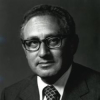Henry A. Kissinger

Henry A. Kissinger
Henry Alfred Kissingeris an American diplomat and political scientist. He served as National Security Advisor and later concurrently as United States Secretary of State in the administrations of presidents Richard Nixon and Gerald Ford. For his actions negotiating the ceasefire in Vietnam, Kissinger received the 1973 Nobel Peace Prize under controversial circumstances, with two members of the committee resigning in protest. Kissinger later sought, unsuccessfully, to return the prize. After his term, his advice has been sought by world leaders...
NationalityGerman
ProfessionStatesman
Date of Birth27 May 1923
CountryGermany
To have striven so hard, to have molded a public personality out of so amorphous an identity, to have sustained that superhuman effort only to end with every weakness disclosed and every error compounding the downfall--that was a fate of biblical proportions. Evidently the Deity would not tolerate the presumption that all can be manipulated; an object lesson of the limits of human presumption was necessary.
Far too often, the Ukrainian issue is posed as a showdown: whether Ukraine joins the East or the West. But if Ukraine is to survive and thrive, it must not be either side's outpost against the other - it should function as a bridge between them.
The convictions that leaders have formed before reaching high office are the intellectual capital they will consume as long as they continue in office.
The British capitalize on their accent when they don't want you to know what they're saying. But if you wake them up at 4 A.M., they speak perfect English, the same as we do.
For the Soul of France is masterful history, brilliantly researched, and hard to put down.
In the current [Carter] administration, who can use the White House swimming pool and tennis courts is decided at the very highest level. President Ford did not bother himself with such minor details. He let me swim in the pool. He only got upset when I tried to walk across the water.
Behind the slogans lay an intellectual vacuum.
You know, this is a very strange phenomenon. I keep reading that in American newspapers, and I keep reading extensive speculations. I meet with the Chinese leaders periodically, and while I don't say they've endorsed the missile shield, it has not been in the forefront of their discussions.
More and more of the Taiwanese economy is connected with the mainland. There are more and more exchanges taking place. There's no reason to doubt that over a period of ten years or so, or maybe more, the conditions of life on the two sides of the Taiwan Strait will become more comparable, and the dialogue on the political level therefore easier.
I don't think we should pay people to fight terrorism. I would be amazed if they asked for anything in return.
The position is that stability and peace in Asia depend on a cooperative relationship between China and the United States.
I would have said, before the World Trade Center events, that he would try to get a normal relationship with China - making clear to China what the limits are of what America can accept, but also showing understanding for some of Chinese necessities. I thought he was moving towards the position that I have more or less advocated.
Well, he keeps saying that, and as defense secretary, of course he has to think of a lot of potential enemies. I do not think it's a wise course to articulate this or to base our policy on it. And I do not see under modern circumstances what we would be fighting about.
The defining issue is that the government in Taiwan was considered to be the government of all of China, and the authorities in Beijing were not recognized as a government of China. So Taiwan was the residuary for all of China.